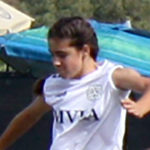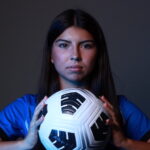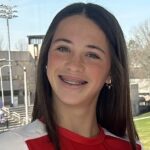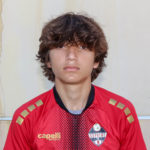Duke coaches outline traits of successful recruits
By Jimmy LaRoue
KANSAS CITY, MO. – With the recruiting process starting earlier and earlier in a player’s development, the characteristicscollege coaches are looking for have become even more vital.
That’s especially true when those coaches see a player just a handful of times before determining whether to offer that person a scholarship, according to Duke women’s soccer coach Robbie Church.
He, along with the Blue Devils men’s coach, John Kerr, outlined nine specific traits they seek when recruiting a player to Durham during a workshop here at the NSCAA Convention on Thursday.
“The recruiting is unbelievably early,” Church acknowledged. “It’s not healthy, but it’s what it is.”
Church said he would leave Kansas City this weekend to attend a Region IV ODP championship in Phoenix, where he plans to concentrate on 24 team players.
“I’m only concentrating on sophomores,” Church said. “We’ve finished our 2012 class. We’ve finished our 2013 class. So the ceiling of those players — they’re not even near their ceiling at this point. “
The nine areas they look for include:
• Competitiveness
Kerr said coaches should “create an environment of competitiveness.”
• Athleticism
The two coaches are looking for small, sharp movements from players, with Kerr saying he likes to watch teams warm up.
“It’s the sharp movements that we’ve got to get used to,” Kerr said.
He said adding yoga can aid in flexibility.
“As you get to a higher level, there’s a minimum standard for athleticism,” Kerr said. “When you play in the ACC like we do, if you can’t survive athletically, you’re going to be blown away, no matter how good you are.”
• Willingness to take players on one-v-one
Church said he wants to see players take on other players and to take people off the dribble. He wants them to take risks, noting that it is one of the most important things he wants to see in recruiting a player.
“It’s a lost art, I think, in the game,” Church said.
Kerr said he is looking for players who can separate themselves.
• Special qualities
For women, Church wants to see players who are good in the air, and ones who can play a ball 50-plus yards to relieve pressure. Finding a goal-scoring forward doesn’t hurt either, he said.
• Working off the ball
Kerr said he was transformed in this area when he was 17. In 1982, his father John Sr., a U.S. soccer legend as both a player and coach, took him to a match at Giants Stadium between then-World Cup champions Italy and the NASL All-Stars.
“I go to the game, and my father succinctly said, ‘John, don’t watch the game today.’ And I said, ‘What do you mean?’ And he said, ‘Just watch number 20,’ referring to Paolo Rossi, who won the Golden Boot at the World Cup.
“Watch what he does” when he doesn’t have the ball, his father told him.
“That’s when I learned how to run off the ball,” Kerr said. “That means, ‘What am I doing when the ball’s in the back (if I’m an attacking player)? Am I running all the time? No.”
He said players should be more clinical, as Rossi was.
Taking players to high-level matches, or, at least to watch those type of matches, can aid in this quality.
Church is looking for the types of angles players take and how hard they check back to the ball, noting that many players find ways to hide in a big game. He said getting players to play shorthanded against one another in training can help with this.
Kerr said it helps if a player can visualize movement off the ball, that would help immensely.
• Coachability
“For them to reach the top level, they’ve got to be really coachable,” Kerr said. “I’ve got to know they’ve got to be really coachable before I’m going to take my precious scholarship money and invest that into the players, too.
He said it’s probably hard for the club and high school coaches to get over, “but it’s easier for us as coaches to let them go,” Kerr said.
“We’ve marked off a number of players because they aren’t coachable,” Church said.
• Fitness
It’s a big holdback at the college level, Church said of fitness. If a player comes in healthy and fit, he said it means the coaching staff can focus more on tactics. For ACC play, which often involves playing two games in a span of a three days, it’s that much more important.
“If you’re not fit, it makes cowards of us all,” Kerr said.
He said it’s easy to disguise fitness for younger players by making it more of a game.
• Psychology
When he’s scouting players, Church said he likes to watch the first game and the last game of a player in a tournament to see the difference in their performance. He wants to see the mental makeup of a player.
• Experience
Have they trained or played with youth national teams? Have they gone overseas? Have they traveled, or trained with boys? What kind of program are they coming from?
Church looks for all of these things.
Both coaches look for a minimum standard before investing time in getting deeper in the recruiting process. They watch videos submitted to them, go to games, talk with coaches. They want to see a person who can meet the school’s academic standards and is a quality person overall.
Kerr said that while all the attributes are important, if a player doesn’t have speed, he won’t be looking at him long because they won’t last in the ACC.
Kerr wants people who not only put themselves in the right positions, but carries out his responsibilities as well. He said at the college level, they “assess players quickly.”
“A lot of players see the game,” Kerr said. “They know what to do, but at the end of the day, can they execute?”
The Duke coaches said several factors hold players back when they reach college: defending, speed of play, risk taking in the final third, heading, playing under pressure, understanding structure and fitness.
For Church, the biggest is defending – both as a team and individually – saying their technique and work ethic in that area is lacking. He said they demand their players, especially forwards in a three-striker attack, defend hard.
“Sometimes the elite players haven’t been asked to work on the other side of the ball,” Church said. “It is a little shocking at times.”











